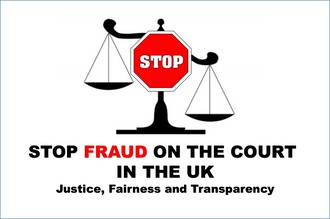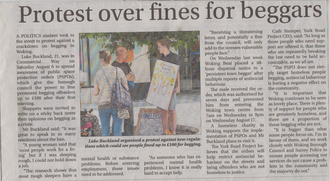-
Bike Shelters for GHA TenantsAfter a few days of dragging the bike up and down 6 flights of stairs and struggling through the heavy fire doors young people begin to find cycling is not so much fun The tenants are not allowed to store anything on the landings Bikes / prams / buggies / mobility scooters are not stored. They are parked - ie they are in use and not stored anymore than cars are stored in the parking areas outside One elderly lady struggling with her walking was not allowed to park her mobility scooter inside The landings, unlike the flat hallways, are spacious with lots of nooks to park a bike or mobility scooter or pram without impeding traffic, despite what the housing officers say It is fairly certain that a bike pram or mobiility scooter is less of a fire hazard parked in a cement corridor than in a small hallway But why not build bike shelter for prams and bikes and scooters? This is Bike Week in Glasgow. Please ask GHA 08004797979 and / or the Wheatley Group who are "committed to a Greener Glasgow", how they are supporting Bike Week : Wheatley Group, Wheatley House, 25 Cochrane Street, G1 1HL or phone 0800470707 Monday to Friday, 9am-5pm.36 of 100 SignaturesCreated by Em Bee
-
Stop landlords refusing people on housing benefit.It is discrimination, like saying no Irish or no Jews. The very poorest and sometimes the hardest working people are discriminated against when they try to find a rented home. Estate agents will turn them away because tenants on housing benefit are not allowed on most buy to let mortgages. The poorest, often disabled or people working hard on low incomes already too poor to own their own home are denied a basic human right which is to have a home. Estate agents will usually ask for references, and conduct a credit check of any prospective tenant and the tenant will have to find a considerable sum of money upfront so why is this extra caution required. It is prejudice pure and simple.9 of 100 SignaturesCreated by Susan Durston
-
SAVE OUR GREEN - MONTAGU ESTATEInvestors ISOS wish to build 12 houses on the last field on our estate. This is the last piece of green for our children to play on and people to walk their dogs. We used to have a strip of green through the estate and now there is only 19% left and they want to take that away from us also. There are other sites (brown field) which are ready for development, but in less desirable areas. If they developed on our Burnfoot Way site this would have a detrimental impact upon residential amenities and the standard of living for the whole community, reduce house prices for private owners, prevent the disabled and elderly from any visible greenery. • With no place to go our children will not be able to play. • A possible 30-40 people to share what is left of our space. • Over-development will crowd our area with more brick and square walls, leaving little to no character left. • For 6 months to a year our area will be flooded with noise and smell from construction of these buildings. • Loss of privacy. • Overshadowing/loss of light on roads and bottom floor flats. • Public services, such as drainage and water supply. • Highway safety is compromised: traffic generation, road capacity, means of access, visibility, car parking and effects on pedestrians/cyclists.938 of 1,000 SignaturesCreated by Stephanie Sutton

-
DECENCY, DIGNITY & AFFORDABILITY - NO PROFITEERING FROM HOMELESSNESS!Connolly & Callaghan (owner of popular Stokes Croft complex Hamilton House) are the leading provider of homeless accommodation in Bristol. When Bristol City Council accepts a legal duty to provide housing for someone in need there is a strong possibility that it will be a Connolly & Callaghan property they are housed in. An ACORN member who wishes to remain anonymous has discovered that Connolly & Callaghan have been buying up property in our city and evicting the existing tenants in order to create more homeless accommodation. These former tenants are then forced to look for somewhere else and some made homeless. More homeless people means more ‘customers’ for Connolly & Callaghan - whose rent is paid for by Bristol City Council. And these are no ordinary rents, often charging £250-£350 per week, Connolly & Callaghan are raking in a tidy profit. In a recent letter evicting tenants from Carpenters Place in Knowle, General Manager Phil Callaghan wrote “All private tenants are being asked kindly to leave Carpenters Place and find alternative accommodation so that the company can continue with helping the ever growing need of homelessness...In order to make the transition period as easy as possible we will allow you to terminate your tenancy with us without a notice period…” As if this wasn’t enough, there have been reports of terrible conditions in the hostels ran by Connolly & Callaghan, with cockroaches, rats and raw sewage in one in Bedminster. It is unacceptable that Bristol City Council pay extortionate amounts to a private company that is cynically profiteering from the housing crisis by evicting tenants and providing substandard living conditions. We need decent and dignified homeless accommodation at a fair price and we need the Council to take the lead in making this happen. Please sign and share and don't forget to tick the box to stay in touch with us! UPDATE: Independent media organisation The Bristol Cable have covered this story in detail. For full information read the article here. https://thebristolcable.org/2016/05/bristol-firm-profiting-from-housing-homeless-by-kicking-other-tenants-out/914 of 1,000 SignaturesCreated by Nick Ballard

-
Stop the eviction of the Brentford Houseboat CommunityThis Will: Save the council an estimated £4 million pounds to spend on schools ect Stop the environmental destruction of an essential tidal stretch of the Thames Save the valuable kingfisher and heron nesting sites Stop the reduction of the size Watermans park to make way for a car Park Save a valued community of local residents Reduce the gentrification of a once diverse area of London This thriving community of Brentford residents have lived and worked in this area for up to 20 years. We are being forced out by Hounslow Borough Council because this area has become a magnate for developers. Selling over priced glass boxes often to overseas investors, changing the character of this historic part of West London. We are not against change and want to be included in the regeneration of the area. These boats are our homes, much loved and in some cases Nationally reconsidered historic vessels with some of them making valuable contributions to one or both war efforts. Please help us convince the council to adopt our low cost, low environmentally impacting solution and save our much loved homes.1,027 of 2,000 SignaturesCreated by Paul Mendoza
-
Lewisham Council: Develop Besson Street for local housing needsThe Borough of Lewisham plans to develop a private rented sector (PRS) scheme on its site at Besson Street, which has been in public hands for decades. While a council-run PRS scheme does avoid the loss of social housing to Right-to-Buy, Lewisham have unfortunately decided to set 65% of starting rents at market level in this scheme, partnering with a private company that will profit from this. While Lewisham say profits will also fund council services, it will not address the housing needs of local people. In the midst of a housing crisis Lewisham should be using public land to help house local people afflicted by the crisis. While the Besson Street site is technically in Telegraph Hill Ward, it is more obviously part of the other areas north of Queens Road, which according to the GLA ward atlas are in the lowest median income bracket in London. This means that market rents in new-build housing will be well out of the reach of nearly everyone who lives locally. The result will be housing provided for higher income people from outside of the area. This will help drive a process of gentrification that will make the area more expensive for everyone. Given the diversity of the area, and the economic gap that - for historical reasons - exists between white and minority ethnic groups, this means the scheme will disproportionately disadvantage the ethnic minority residents who live locally. Lewisham even present this scheme, on a site which used to contain council housing, as one to help address the housing crisis. Whose housing crisis are they trying to solve? Those who lack new-build flats at market prices? There are plenty of such schemes being built all around Lewisham. The real housing crisis - among those on low incomes - is being ignored by this scheme. This is not what residents should expect of their local authority. We call upon Lewisham to use the Besson Street site to provide housing for those in most need.277 of 300 SignaturesCreated by Jacob Stringer
-
Revenge EvictionDate: 9th August 2015 Dear Sirs, I write with regard notice applied for by my landlord for rent arrears. I provide the following defence that a) provides details of process failures by both landlord and letting agent prior to the incident of rent arrears, and b) provides my repayment offer to clear the rent arrears. Please note the following:- History To summarise, there were some failures of process made by both landlord and letting agent:- 1. NPower dispute. Caused by letting agent mixing up gas meter readings. 3 emails provided from communication trail with NPower, Energy Ombudsman and OfGem as evidence of this. 2. Lease extension not properly executed. Evidence attached. 3. Letting agent enter property without my permission. Evidence attached. 4. Landlord not updating Hazelvine of true details, accrued service charges, used my address as her correspondence address. Evidence attached. Below provides a brief timeline of events over the whole tenancy:- 1. 2013 – moved from Address 1 to Address 2. Reason for moving was that I was unhappy with the conditions of previous property and lack of restorative/reparatory work by the landlord. This gave rise to the Requirements for Accommodation checklist (evidence item 1). Let me expand on issues with this previous accommodation:- a. Jan 2004 – moved to Address 1. b. 21st August 2009 – property sold from Landlord 1 to Landlord 2. Informed in writing of this, ref Appendix A of MMCN0140. c. 6th December 2010 – report made to Landlord 2 of defective shower, ref MMCN0061. d. 11th June 2011 – offer made to Landlord 2 to refurbish Address 1, ref MMCN0109 as something other than residential. e. 10th August 2011 – further offer made to Landlord 2 to refurbish 18A Parson Street, ref MMCN0121. f. 16th December 2011 – complaint made about conditions of property to Landlord 2 ref MMCN0140. Bristol City Council copied in on correspondence. No action was taken to rectify these reported issues. g. 22nd February 2013 – 2nd complaint made to Landlord 2 ref MMCN0186. No action was taken to rectify these reported issues. h. 17th August 2013 – notice given to landlord 2 ref MMCN0191. Notice letter made reference to 2 complaint letters. 2. 14th September 2013 – I officially moved into 91 Parson Street. Relations with letting agent were good, i.e. Agent 1, Agent 2, Agent 3, Agent 4. 3. When I first moved in, I noticed a discrepancy with the gas bill. I had 9 months of correspondence with NPOwer, Energy Ombudsman and OfGem to get this corrected. The reason for the discrepancy was that the letting agents had mixed up gas meter readings between my property and another. I have all this correspondence and can use as evidence if required, I enclose a CD of this correspondence and relevant documents. 4. Quarterly inspections were carried out at the planned times Agent 2 with myself present. Good reports were provided to landlord via letting agent. 5. Sep 2014 – Portfolio Manager changed without notice from Agent 2 to Agent 5. 6. Sep 2014 – Planned inspection for 30/9/2014 cancelled without sufficient notice, i.e. same day. Inspection rearranged for new date, then on that date, was informed she got the date mixed up with another inspection and had already been into property to inspect and had sent the report. The inspection report sent to landlady was fine. Letting agent entered property without my permission. I can provide email of letting agent admitting this. 7. Sep 2014 – there was some toing and froing with the 12 month tenancy extension. I did sign and return the lease agreement as requested, but was returned without letting agent signature. Although, signing of the new agreement should not have been via post but in person such that the witness signature can be put on at that time, no appointment was made to do this. Lease agreement extension paperwork not properly completed. I can provide emails of correspondence where I wanted to sort out. 8. I have copy of agreement signed by myself. 9. Dec 2014 – found out about landlord not informing Hazelvine of her proper address and of arrears with service charges amounting to approximately £1,000. I have paperwork providing 3 separate addresses for the landlady, i.e.. original lease agreement signed under witness 14/4/2013 states her address as Marshalls Drive, then 12 month extension for Sep 2014 (which would have taken me to Sep 2015) states address as Henrietta House, Haringey, then I now have paper work (Sec 21) stating address as Carlton Lodge, London. 10. Dec 2014 – I informed Hazelvine of the landlord address to what I had on lease agreement paperwork as Henrietta House. Landlord not updating Hazelvine of details, therefore they defaulted to last known address, i.e. my own address. I have an email from Hazelvine solicitors. 11. I subsequently reported this to Action Fraud as it looked suspicious, and had I not, the service charge arrears could have continued to accrue in my opinion. I informed Ocean of my Action Fraud report ref letter MMCN0200. 12. After advice sought from the Citizens Advice Bureau, I wrote to the landlady at the last known address with regard rent arrears and making arrangements to clear these with herself, and continue leasing the property maintaining good landlord/tenant relations. 13. I informed Bristol City Council tenancy relations of the issues I was having. 14. I requested that she phone me or email me with regard all of this by Monday 25th May 2015. I have not heard from her, and sought further advice from the Citizens Advice Bureau on Wednesday 27th May 2015.30 of 100 SignaturesCreated by Colin Noakes
-
STOP FRAUD ON THE COURT IN THE UKFRAUD ON THE COURT IN BRIEF: Those instigating Fraud on the Court do not pay the court’s fees to obtain fake warrants or court’s orders used to deprive law abiding citizens stealing properties, land, money and assets. Invalid court’s papers are then used to secure unlawful entry and adverse occupation of residential premises by means of violence combined with the creation of a sense of authenticity through the invention of false court’s documents which appear to be factual. Fraud on the Court involves (with intent) a serious abuse of the court’s process and “contempt of court” (Common Law). The victims are routinely ignored by the already overstretched police and other law enforcement bodies who are unable to investigate thoroughly and independently. No matter what undeniable evidence is provided, there is no redress for the victims who are told that this scam is ‘it’s a civil matter’. It is a matter of fact that when victims DO REPORT this crime NO ONE INVESTIGATES. The only option left is to go back in the hands of the same staff in courts who are perpetrating the scam. FRAUD BY CONCEALMENT: The victims are denied inspection and copies of data from the court’s file which remain concealed. Victims are also crucially denied access to and release of the computerised court records where all the documents and interactions with the court of any party into the proceedings are recorded. The nature, extent and sophistication of this fraud, is far beyond the comprehension and reach of the average litigant in person and law enforcement officers by the police force. We are asking for the full support of: All Her Majesty the Queen’s servants who are designated to ensure a fair and just society against this serious organised crime. We are demanding urgently a Public Inquiry to investigate fully and independently the seriousness of the crimes involved by using Fraud on the Court. The non-payment of the court’s fee is not only a major deception and fraud on the on the public purse but also on the individual. This theft on the public happens in a time when the UK court’s system is crying for more funds. The recent sharp increase in the court’s fees have already reduced considerably the access to justice for the most vulnerable that cannot afford to pay. Fraud upon the court is devastating for the victims waiting and hoping to receive relief from the courts. The victims lose their homes, their assets, their jobs, their companies and ultimately their liberty and health in breach of their fundamental statutory rights. This adds burden on the already struggling NHS and Social Security systems whilst the income from many tax payers is lost. This scam is often used by banks, legal professionals, private companies, and dishonest landlords and council officers aided by court’s officers. Meanwhile criminal convictions and assets stripping founded on complex illegalities and irregularities send every day honest hardworking families and people left penniless and homeless in the streets begging for help. Innocent families and people are held hostage with children and frail old people ending up homeless and traumatised as victims of Fraud on the Court. Those few victims of Fraud on the Court who persist in chasing justice are being passed between agencies without any result or redress. Stealing from people is a crime. Taking away their assets and homes making people homeless with Fraud on the Court is a very serious and sophisticated crime for which there is no defence for the victims. Fraud of any kind is a crime and Fraud on the Court is one of the worst. An unpunished crime encourages new ones. Those committing Fraud on the Court are still there and get away with impunity. It is only a matter of time before someone you know will become the next victim. In the public interest, in order to strengthen the fairness, accountability and transparency and in name of justice join by signing this petition for a Public Inquiry and ask for the Parliament’s full support to investigate and stop the Fraud on the Court in the UK. Any person who believes to be a victim of Fraud on the Court can send their opinions contacting UK PEOPLE at a new email address to come as ODDLY our 1st email address has been hacked and the account disappeared mysteriously from Google.....Strange he.... ?!? Useful links: The Fraud Act 2006 - http://www.legislation.gov.uk/ukpga/2006/35/contents The Protection from Eviction and Harassment Act 1977 - http://www.legislation.gov.uk/ukpga/1977/43/contents The Tort (and interference with Goods) Act 1977 - http://www.legislation.gov.uk/ukpga/1977/32/contents Fraud on the Court - What is it? - http://www.legalmatch.com/law-library/article/fraud-on-the-court.html Fraud on the Court - Some stories of honest families plainly wronged - here: The next phase of the Crawford Castle - (Type and search for 'The next phase of the Crawford Castle' to watch one of our selected videos on Youtube) https://www.youtube.com/watch?v=rLtdNlwPckQ Fraud on the Court - Evictees and families Unite: https://www.youtube.com/watch?v=dfkSW4LvvXM Civil Matter or Criminal Matter? - https://www.youtube.com/watch?v=2jG045tnTaI The drama of the Jackson's Family exposed on BBC - https://www.youtube.com/watch?v=WxHHaOOBzyU875 of 1,000 SignaturesCreated by UK PEOPLE
-
Bristol Needs A Mayor For HomesBristol is in the midst of a worsening housing crisis. With over 10,000 on the housing waiting list and private sector rent increases of 25% in just four years the situation is getting desperate. We need more homes of all types to help people onto the property ladder and to ensure there are enough affordable homes for those who need them. Private tenants need protection from extortionate rents and poor living conditions. On 5th May Bristol will elect a new Mayor. Whoever the winning candidate is they must make ending Bristol's housing crisis their number one priority. A new coalition of groups has formed to lead a single, united campaign - A Mayor For Homes. Please join us and make sure that Bristol's next Mayor delivers more, affordable housing and protections for tenants.239 of 300 SignaturesCreated by Nick Ballard

-
Begging should not be banned in WokingBegging is not harmful. Woking Borough Council argue that begging can be intimidating. But if someone feels intimidated, the Police can use existing powers under the Public Order Act. The council also said there is no need to beg in Woking- because there is sufficient help available. However, the waiting lists for NHS mental healthcare, and substance misuse treatment are not short. It is also claimed that many people who beg aren't actually homeless. Of course, lying about your circumstances is fraud and the Police can use existing powers to deal with it. This campaign is based on this information from Woking Council's website: https://www.woking.gov.uk/community/safety/pspo If you have anything that suggests that Woking Borough Council are no longer able to fine people for begging then we'd love to hear more from you, drop us an email at [email protected]1,612 of 2,000 SignaturesCreated by Luke Buckland

-
Stop Bristol City Council auctioning off our Council HomesACORN the Community union is launching this petition to protect Bristols council homes. Council Housing is an essential community asset, that gives less fortunate people a secure home at an actually affordable price. The Mayor claims it will cost too much to refurbish these homes, but any cost would surely be recuperated within a few years of collecting rent on them; and this argument ignores the social cost of selling off another one of our cherished community assets. Earlier this week Labour's Mayoral candidate Marvin Rees did a public service by drawing attention to the planned mass auction of Council Homes by Bristol City Council and the Mayor this coming April the 20th and calling for its halt. Many Greens and progressively minded people from across the political spectrum support this call. Some of our councillor's have objected to the auction of homes when they are in their wards, but as in many things their objections mean nothing when the Mayor is committed to it. That's why we need people power to stop this now before its too late. Please sign and share this petition far and wide and put a stop to Bristol City Council's flogging of yet more of our collective assets. Full list of the homes up for sale available here: https://m.facebook.com/groups/440011226079038?view=permalink&id=977946188952203 [picture taken from Bristol 24/7 article http://www.bristol247.com/channel/news-comment/mayor-election-2016/news/calls-to-halt-council-housing-auction originally from Hollis Morgan of some of the homes going under the hammer.]4,782 of 5,000 SignaturesCreated by William Quick
-
Save Carlisle Women's RefugeThe refuge is a safe place for women who's lives have been shattered by rape, sexual assault and domestic violence. Without this safe place, which although only short term, provides much needed breathing space. Not only that it shows these people that not everyone is out to hurt them. The removal of funding for these vital services, gives abused women the message that no one cares and it is ok for them to be abused. Is this a good message to send out across Cumbria?3,629 of 4,000 SignaturesCreated by Eleanor Jasper
Hello! We use cookies to improve your experience by providing insights into how the site is being used. Find out more.












